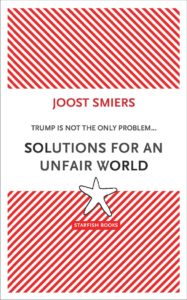Solutions For An Unfair World ~ Peace In Our Time?
No Comments yet In Europe we are at a loss: the US nuclear control button is in the hands of an impulsive president. Impulsivity is generally not conducive to the establishment of stable relationships in the world. If it concerns a weapon of mass destruction, there are reasons to be anxious. Just to reassure the reader: initially the president does not decide on his own; he has to go through some reviews, but in the end it is he who decides, and the whole process of decision-making barely takes a few minutes.
In Europe we are at a loss: the US nuclear control button is in the hands of an impulsive president. Impulsivity is generally not conducive to the establishment of stable relationships in the world. If it concerns a weapon of mass destruction, there are reasons to be anxious. Just to reassure the reader: initially the president does not decide on his own; he has to go through some reviews, but in the end it is he who decides, and the whole process of decision-making barely takes a few minutes.
In order to make the complications even bigger: the relations with Israel are very cordial under a Trump-government. Israel has not yet abandoned the idea that the nuclear agreement with Iran is null and void, and should be undone. It seems that Trump endorses Israel in this, or at least wants to renegotiate the agreement. You don’t have to be a stranger in Jerusalem to realise that all the ingredients are in place for escalating tensions between the United States and Israel on the one hand and Iran on the other. In this scenario, an atomic bomb may also occur.
The problem is that the European Union as a whole and the European countries individually barely count on the world stage. The United Kingdom is withdrawing from the EU and will need some time to recapture a separate position, apart from the fact that the country has always tended to support the US, in an economic but also in a diplomatic sense. All of this does not make Britain the appropriate force to put the emotions at rest. France and Germany are also not powerful enough to influence the policies of the United States, Israel and Iran, either alone or together. This will have to come from a common Europe, and thus from the European Union.
Why do we need a strong Europe, at least in this respect? A possible military conflict between Israel and Iran will take place around the corner from us. We will certainly be aware of it, especially if the Middle East becomes a major war scene. Only a powerful Europe can exert a mitigating effect on parties where hot-heads are in power. It is of course strange that the negotiations with Iran were conducted mainly by the US, with the EU and some European countries in assistant roles. That really has to change. A top priority should be that the EU states publicly and diplomatically that the deployment of a nuclear weapon or any other military action will not be tolerated. For this purpose only a strong EU can join coalitions with other countries that are also opposed to war. It is clear that, given the weak diplomatic position and will of Europe, nothing will come to fruition unless there will be a strong peace movement in Europe again.
One of the mottos of the past could be reiterated: all nuclear weapons should be removed from the face of the earth. This is all the more necessary because, as far as nuclear weapons are concerned, hacking lies in waiting. Commands that can set off an atomic bomb can be taken over by hackers from a foreign country. Nuclear weapons could be unleashed upon another, i.e. a third country, or targeted at sites within the country that owns the nuclear weapon. It is also apparent that in the United States – and probably not only there – systems that lead to the launch command show serious flaws. This can mean that the launch will not succeed or that it will take place unintentionally. (New York Times, 16.3.17)
It does not contribute to nuclear safety in the world that Donald Trump has announced that the US should have even more nuclear weapons, since Russia is now perceived to have more; it depends how you count. So there is every reason to conduct a global campaign, as broad as possible, to urge for negotiations about a substantial reduction, if not total withdrawal of all nuclear weapons. In this context it is encouraging that the Nobel Peace Prize 2017 has been awarded to ICAN, the International Campaign to Abolish Nuclear Weapons. Within such a context it should be recognised that North Korea, under strict conditions, is also a nuclear power, just like Iran. In Iran the option was to destroy its nuclear weapons, with as a certain outcome a terrible war in the Middle East. Fortunately it has been decided that is was better to negotiate and to bind Iran to conditions for the possession of a nuclear weapon. Although this will not be easy, this procedure is the only possible option for North Korea as well. Now it’s time to make Donald Trump aware of this and to make him forget that he has blamed Barack Obama for making a fatal mistake in closing the deal with Iran. Perhaps Trump will ever realise that Obama acted wisely (apart from the fact that at the beginning of his presidency Obama called for all nuclear weapons to be removed from the face of the earth, after which he decided to order a few more).
The possible rekindling of military conflicts in the Middle East is not the only threat which emanates from the United States. Many signs indicate that the country will be even more militarised than it already is, and some believe that a creeping coup can not be ruled out. The US has a great tradition of interventions in other countries, in order to put more friendlier regimes into power. This has always happened as secretly as possible, because they did not want it to be public knowledge. After 9/11 this has changed. Regime change has become something you can talk about more openly, even though catastrophe has followed upon catastrophe. Trump’s autocratic tendencies make you suspect the worst.
Is an autocratic regime in the US unthinkable? Whatever happens, it’s not encouraging that only 19% of the young Americans is opposed to a take-over of the leadership of the country by the military. In Europe, that figure is 39%. In short, the militarization of our societies is not just fiction anymore. SIPRI, the Stockholm International Peace Research Institute, reports that in 2015 seventeen hundred billion dollars were spent on armaments worldwide. That’s more than thirty percent more than in the hottest phase of the Cold War. Add to this the cyber attacks that can shut down whole societies, and the illusion and hope that the world will only become more peaceful ends in smithereens.
Perhaps it will fall on deaf ears, but still it’s a pleasure to listen to Dwight D. Eisenhower, who on January 17, 1961 – three days before his resignation as president of the US – gave an impressive speech about the danger of the military-industrial complex for his country and the rest of the world. This is his warning: ‘This conjunction of an immense military establishment and a large arms industry is new in the American experience. The total influence – economic, political, even spiritual – is felt in every city, every State house, every office of the Federal government. We recognize the imperative need for this development. Yet we must not fail to comprehend its grave implications. Our toil, resources and living are all involved; so is the very structure of our society. In the councils of government, we must guard against the acquisition of unwarranted influence, whether sought or unsought, by the military-industrial complex. The potential for the disastrous rise of power exists and will persist.
We must never let the weight of this combination endanger our liberties or democratic processes. We should take nothing for granted. Only an alert and knowledgeable citizenry can compel the proper meshing of the huge industrial and military machinery of defence with our peaceful methods and goals, so that security and liberty may prosper together.’
For the time being, these wise words seem to be the dreams of an old man from a bygone era. However, after the election of Trump the stock prices of the arms companies increased worldwide. Now that he is president, he wants to push up the defence budget with tens of billions of dollars, to the detriment of – among other things – the diplomacy, the US contribution to the United Nations, and international aid. This accomplishes what I already feared: the great misunderstanding that the world will become more peaceful, and that American interests will be better served if more weapons are put in place, and then again of the kind with which the wars of the previous century were won (or lost).
At the same time, in Europe, the pressure is increasing to raise defence budgets to two percent of the individual member states’ spending, and the urge is growing to invest a lot in military research, especially in new weapon technologies. Suddenly, there is also a need for a better integrated army in Europe. On Monday, November 14, 2016, the EU ministers gathered to confirm all of this. At the end of the session the European Commissioner for External Relations, Federica Mogherini, stated that a quantum leap towards a European security and defence policy was being made.
How has this all been possible in Europe? Firstly, one would be inclined to say: that is because of Russia – but more about this later. The second thought goes to NATO. After 1989, many thought that this instrument had had its longest time, due to the collapse of the Iron Curtain. However, the opposite has happened: NATO has insidiously expanded its action range to the borders of Russia. Europe has allowed this to happen, accepting the American interests that were at stake, and did not have to worry about NATO’s costs, because for a substantial part they were taken up by the US. Understandably the confusion is great now that Trump suddenly declares that Europe has to pay for its own defence. In itself that is not even a crazy demand.
The consequence is that in Europe we have to think about what kind of defence we want. As we have seen the reflex is: more weapons, múch more weapons. That’s a road we certainly should not take, because it leads to a weapon race, of which we know where it starts but not how it will end. Probably in a fatal way. Which road looks preferable?
First of all the question must be asked whether NATO is still the right body to safeguard our interests, especially now that a president has been chosen in the US who is thinking about peace and security in a way that probably does not match with what we are talking about in Europe. Additionally NATO’s Chief Commander is an American, appointed by the American president. It is therefore of the utmost importance that we withdraw from the power concentration of US military and political interests, i.e. from NATO.
Secondly, attention must be focused on what kind of defence we want in Europe. In view of the divisions between the European countries, a joint army under one supreme command is not the obvious solution. With a better integration of various defence tasks and equipment, Europe has sufficient resources to defend itself against a potential enemy. Of importance is that the European Union’s defence system does not in any way look offensive. It should limit itself to defensive tasks. We must prevent that the EU will transform from a soft power into a hard power. For this reason Lourens van Haaften, lecturer of international relations at Utrecht University, warns: ‘The shock, caused by this to the international state system, can have a reverse effect in the long run. Surrounding countries like Russia will feel threatened and will try to break that power. European defence cooperation could thus lead to less instead of more security.’ (NRC Handelsblad, 17.11.16)
If the goal is to achieve more security, the best way to do this is to organise disarmament conferences. But political courage is needed for that too. Who, what politician, which country will send the first invitation to alleged opponents to talk about arms control? This will only happen if, in some countries, large parts of the population will fight for this and, as mentioned above, the peace movement will get stronger.
This takes us automatically to the subject of Russia. Let’s assume that Vladimir Putin is just as terrible a political leader as George Bush once was, when he unleashed a war in Iraq without a mandate of the United Nations, and then found no weapons of mass destruction. However, it is useful to analyse the words and actions of Putin in all sobriety – however difficult that may be and however terrible it is what he is doing – and not immediately respond with NATO in the attack mode. If we can prevent a new world war that way, this is no unnecessary luxury.
It is not difficult to admit that Putin is right when he says that the West, in particular the United States, has often violated the fragile rules of international law. Iraq, but also the extension of the UN Security Council mandate in Libya, is still a fresh memory. The wisest thing the Western powers could do is to sit down with Putin and confess that he is right in that respect. Then the next topic could be: how can we prevent that international law will be used in such a messy and opportunistic way again? For the future world peace such a conversation would be a godsend, and it would take the wind out of Putins sails if he wants to ignore the rules of international law again.
We can agree that the Soviet Union was a catastrophe in many ways, also economically. Yet this is no justification for the way in which American advisors from Chicago’s neoliberal school pushed the privatisation through of all state property, in only a hundred days. Where that has led us we now know: some criminal figures from the Soviet era have enriched themselves horribly, while millions of citizens impoverished from one day to the other, and what was still functioning in the Soviet economy perished. One should not be surprised that the anger and frustration about this is still alive. The West would benefit from shaking off the economic neoliberal yoke itself. Along the way it could make clear to Russia that serious mistakes have been made at the time. It’s up to the Russians what they want to do with that statement, but for the West it is better to stop halfway than to persevere in error.
Historians will have to work for decades to understand why Yeltsin took the idiotic decision to break up the Soviet Union in a matter of just a few weeks. What we see now is that there is a president of Russia who thinks this split was an error of the first order, probably supported by many of his countrymen. Apart from all the religious and Blut-und-Boden rhetoric by which the anger is accompanied, it is quite conceivable that the disintegration of the Soviet Union is felt as the beginning of the impasse in which the country still finds itself.
Vital parts of the Soviet-plan economy were suddenly located in other countries, while secession movements of various radical stripes have cost and still cost a lot of energy. Would it be wrong if the West sat again at the table with the Russian leaders, and in all honesty started thinking with them about how to resolve the issue of a strangely disintegrated country that – let’s be honest – international law does not provide a clearcut answer for? Of course we can be indignant that Russia has annexed the Crimean in a snap, but the question is whether our anger will contribute to solving the much larger nationality issue that Russia and its neighbours are stuck with. Most likely, that is not the case.
The fact that Russia and Ukraine are both utterly corrupt countries is not in doubt. This makes it difficult to do business with both of them. Additionally, the black money circuits also have fascistoid traits. From the outside we can do little to address this. It’s annoying, since if corruption is so deeply embedded in the state apparatus, the leaders are not free from all smells and inclined to talk with a pistol in their back pocket, also at a diplomatic level. The only thing the West can do now is to finally launch a serious effort to immediately put an end to all suspicious financial transactions, tax evasions and outright fraud. This is what must happen anyway. If there is no way to store black money anywhere in the world, this is a first-order contribution to combating corruption in Russia, Ukraine and neighbouring states. Perhaps they will grow to be normal countries.
If the West wants to apply sanctions against Russia, the best solution is to no longer buy gas, and to do what has to be done anyway: to generate renewable energy at home. This is better for the environment and ensures that we are no longer dependent on unreliable energy suppliers who, in the case of Saudi Arabia, finance koran schools or, in the case of Russia, make the economy lazy because, as is apparently thought, the money from the gas benefits will be coming in anyway.
A world war can be prevented if the West will operate wisely and not beat the big drum, but tries to understand the mental make-up of the Russian president and the bitter history of his country.
You May Also Like
Comments
Leave a Reply








